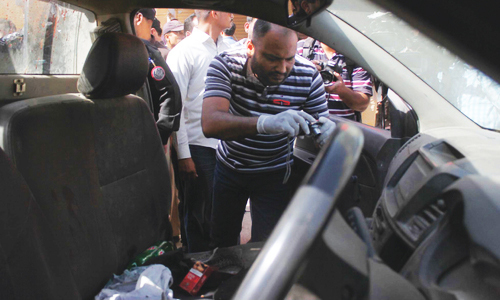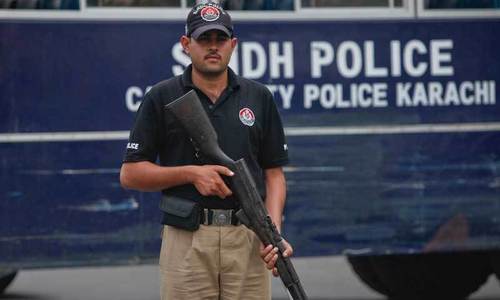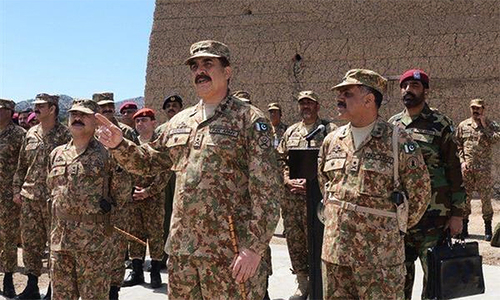KARACHI: Seemingly resolved but blighted with susceptibility in the wake of the bloodshed on Wednesday, thousands of volunteers and policemen resumed their campaign against polio across the city on Thursday as officials said nothing would deter them from their ‘national duty’.
“Some 7,000 teams of volunteers marched in all neighbourhoods of the six districts of Karachi to resume the campaign on its third day,” said a spokesman for the Sindh government emergency operations centre (EOC) for polio.
An official in the provincial health ministry admitted that Wednesday’s shooting in Orangi Town in which seven policemen guarding polio teams were killed by gunmen on motorcycles had certainly created uncertainty among volunteers in many neighbourhoods, but none of them had refused to go in their assigned areas.
Related: FIR of seven policemen's murder registered
“Since it is national duty to eradicate polio from Pakistan, none of our teams in any of the neighbourhood refused to go; however some of them were anxious and reluctant,” he said.
A volunteer whose sister was injured in an earlier incident in Gadap Town said she started as a polio volunteer to earn additional money for her family, but now it became a challenge.
“It is not just a job like any other job,” said the volunteer. “I have been involved in it so much that leaving it will be tantamount to leaving my own children unguarded against a dangerous disease,” she said.
“My sister was among several wounded and traumatised volunteers three years ago when they had been attacked in Gadap, but she is still part of the campaign despite all sorts of dangers.”
Similarly, officials said some 4,500 policemen guarded the volunteers. To bolster their morale in wake of anxiety created by the Wednesday’s incident, they had been supplemented by more than 300 paramilitary Rangers.
“That attack was certainly a part of the plan to demoralise our force, but such dangers come and go, it is a duty that has to be performed,” said a senior official.
He, however, said the attack had certainly pushed the senior hierarchy of the police to do soul-searching to improve on the existing plans.
“We have to go for much better training in addition to better backup arrangements to safeguard the officials,” said the official.
City commissioner Asif Hyder Shah on Thursday went to the EOC Sindh office and reviewed the campaign’s arrangements.
Officials insisted that the actual target of the Wednesday’s attack was police, but they admitted that the ultimate target was polio vaccination campaign as those killed were guarding the vaccinators.
“We are making arrangements to make the campaign more efficient and safe,” said an official.
Demand to call in armed forces
Senior paediatrician and member of the World Health Organisation’s National Immunisation Technical Advisory Group Dr Ghaffar Billoo has said that the killing of seven police officers should compel authorities to take assistance from the armed forces “on an emergency basis”.
He added the armed forces were “a better option under ongoing circumstances as the police do not have the power to stop such attacks whether it is against the polio workers or on their own personnel”.
He said that there were three high risk zones in Pakistan, including Karachi, Quetta and Qila Saifullah in Balochistan and Peshawar and Southern districts such as Tank and Bannu in Khyber Pakhtunkhwa. When asked whether calling in the armed forces was a better option considering their involvement in operations in South and North Waziristan, he added that “calling in the armed forces is the demand of the time as lives are at stake”.
However, chief of National Emergency Operation Centre for Polio Eradication Rana Safdar said authorities had already put in place a three-tiered security apparatus to counter such attacks. “We don’t need to specifically call in the armed forces. Because there is an existing system in which the Police, Rangers, and a focal person from the armed forces in every district coalesce depending on the areas our teams are working in,” he added.
Reiterating the point raised by the authorities in Sindh, Mr Safdar said the attack was not specifically targeting the polio teams rather the police officers.
Quoting a report by the Sindh home department, he said the attack on policemen was a result of “ongoing operations being carried out in district west”.
An officer associated with providing security to the polio teams in high risk zones withholding his name, as he is not authorised to speak to the media, added that they usually received an “advanced intelligence before the beginning of vaccination drive anywhere in Pakistan”.
Speaking further, the officer added that “there was no threat in sight in Karachi but the interior ministry is anticipating such attacks as there is still a lot of risk involved with the polio campaigning.”
In light of the attack on the policemen, Mr Safdar added that they had issued an advisory to the polio teams as well as the security personnel accompanying them to not congregate in one place.
Published in Dawn, April 22nd, 2016















































Dear visitor, the comments section is undergoing an overhaul and will return soon.